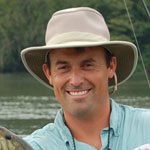
Farm ponds are closed systems, and almost every facet can be controlled through stocking, water chemistry, fishing and nutrient supplements, creating almost any type of result you could ask for. It can be a catfish pond, big bream pond, trophy bass pond or just a balanced pond with awesome fishing. By the end of the summer, heavily fertilized ponds become vulnerable, and owners should keep a close eye on them.
August is the hottest month, and photosynthesis has shifted into overdrive, especially in fertile ponds. Every pond owner wants lots of big fish, and a nutrient-supplementation program is a good way to produce a significant level of fish per acre. In fact, fertilization will double a pond’s fish capacity, but primary producers or the phyto-plankton providing the base of the food chain has critical control over the pond’s dissolved oxygen.
During the day, phyto-plankton converts carbon dioxide to oxygen as a by-product of photosynthesis. The single-cell organisms will multiply and grow to epic proportions, providing tons of dissolved oxygen for fish and other organisms. As the sun goes down, they switch gears and begin to consume oxygen. Periods of cloudy weather will slow down photosynthesis, causing oxygen deprivation and possible fish kills. Additionally, as the water temperature rises, the ability of water to retain dissolved oxygen decreases.
Fish kills from oxygen deprivation are all by-products of excessive primary production in ponds. While blooms are great to grow out fish populations, a train wreck can happen in a hurry. In an effort to reduce fish kills, fertilization should be tapered off in early July and prohibited during August. Cattle and other livestock should be excluded from entering these ponds. Their excrement will provide a dense nutrient input, leading to fish kills. Temporary aerators or permanent fountains should be used. They will help stir up the water to prevent turning over and will provide critical oxygenation.



Be the first to comment